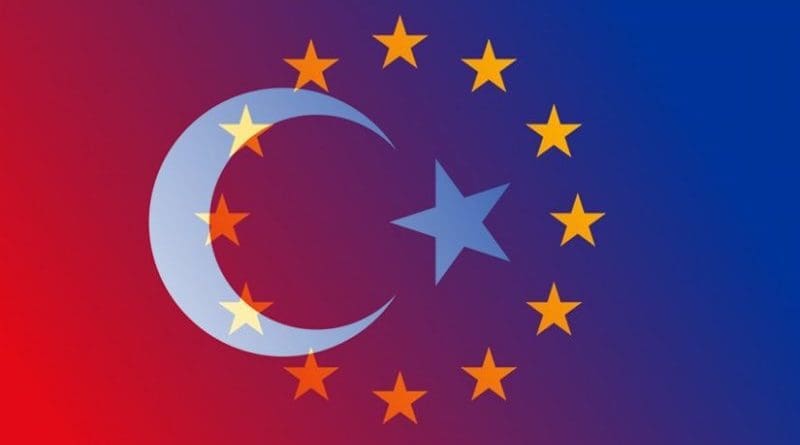Turkey And EU Shadow-Box Over Illusive Accession Process
By EurActiv
By Sarantis Michalopoulos
(EurActiv) — Turkey’s accession process is neither formally suspended nor canceled but the European Commission is not working on opening new negotiation chapters, an EU official told EURACTIV.com following Ankara’s fresh all-or-nothing request for full membership.
The official is normally authorised to speak on the record, but this time asked not to be named.
“The accession negotiations are based on Turkey’s own merits and progress in the negotiations, measured against requirements, among which the respect for the rule of law, human rights and fundamental freedoms, respect for international law and good neighbourly relations,” the EU spokesperson emphasised.
The reaction came in reply to statements from Ankara, suggesting that Turkey, which has been a candidate for membership since 2005, will accept nothing less than EU membership.
In an interview with Reuters on 19 January, Turkey’s minister for EU affairs, Ömer Çelik firmly opposed French President Emmanuel Macron’s proposal for a partnership rather than full EU membership for Turkey.
“A privileged partnership or similar approaches, we don’t take any of these seriously. Turkey cannot be offered such a thing,” Çelik noted.
During a visit to Paris earlier this month, Turkish President Recep Tayyip Erdoğan warned he was “seriously tired” of waiting for the EU to decide whether it wants Turkey as a member or not.
At his State of the Union speech, EU Commission President Jean-Claude Juncker stressed, “Turkey has been taking giant strides away from the European Union for some time.”
“This rules out its accession to the EU for the foreseeable future,” the spokesperson said.
More than 55,000 people have been arrested in Turkey since the failed July 2016 coup attempt, including journalists, lawyers, opposition politicians and academics, as part of a huge purge of state institutions.
It was in light of those developments in the country that Macron suggested a “partnership” instead of full membership.
Turkey’s accession talks started in 2005 but have been stalled due to Ankara’s unwillingness to apply the Additional Protocol of the Ankara Association Agreement to Cyprus, which Turkey does not recognise as an independent state.
On 25 January, First Vice-President Frans Timmermans and High Representative/Vice-President Federica Mogherini will receive Ömer Çelik.
Migration deal
In the same interview, Çelik pointed out that the EU was not fully honouring its part of a key migration deal agreed in March 2016, underlining that financial aid was “not working well”.
“Technically there’s no reason for Turkey to maintain this deal,” he noted.
According to the Commission, the deal has brought positive results. The arrivals have dropped by 97% and the number of lives lost at sea has decreased substantially. In addition, almost 12,711 Syrian refugees have been resettled from Turkey.
Asked for a comment, the EU spokesperson pointed out that the bloc has delivered on its commitment to contract the full €3 billion promised under the Facility for Refugees in Turkey in 2016 and 2017 before the end of the year (72 projects).
“The EU remains committed to the implementation of the EU-Turkey Statement. “This is an engagement of mutual trust and delivery that requires commitment and continuous efforts from all sides,” the EU official said.
EURACTIV contacted the Turkish Permanent Representation for a comment on the €3 billion issue but did not receive a reply in time for this article’s publication.
EPP: Turkey cannot escape
In the meantime, the President of the European People’s Party, Frenchman Joseph Daul attacked Ankara about Cyprus. The island has been divided since 1974, after Turkish troops invaded and occupied the northern part following a coup on the island.
“Turkey is not getting away with not recognising an EU member state, Cyprus,” he told Cyprus New Agency last week.
Referring to the failure of the Crans Montana conference on the Cyprus reunification talks last June, he said it was a “disappointment” and urged Turkey to facilitate the process by withdrawing its troops.
“We call on Turkey to facilitate a climate conducive for free negotiations, and to contribute concretely to the ongoing efforts for a settlement, including by withdrawing Turkish forces,” the French politician said.
Summit or no summit?
On a visit to Sofia last Saturday (20 January) on the occasion of the start of the Bulgarian Presidency of the Council of the EU, German Chancellor Angela Merkel said Germany welcomed a Bulgarian initiative to organise a European Commission-Turkey summit this spring.
Merkel said such a summit, including the presidents of the three European institutions (Commission, Council and Parliament), was a good idea. The summit is planned for March in Varna.
Merkel’s announcement, which came in reply to a journalist’s question, was rather surprising. Erdoğan has been pushing for an EU-Turkey summit during the Bulgarian Presidency. However, such a summit doesn’t appear in the Bulgarian Presidency programme, which is closely coordinated with the EU Commission.
EURACTIV asked the Commission Chief spokesperson Margaritis Schinas on 22 January to comment on the news from Sofia. In his answer, Schinas made it clear that such a summit could only take place under certain conditions.
He said the idea for such a meeting “is there”, but added that the Commission had already said it cannot confirm specific dates.
“Let’s see. This is not a summit in the way of the Leaders’ Agenda summits, it’s not part of the overall “Road to Sibiu” but still it’s a meeting that could take place once we are ready and once the conditions we discussed are also in place”, he said. Sibiu is the location of a summit to be held on 9 May 2019, under the Romanian EU Presidency, and is expected to be the venue for Juncker’s curtain calls.
Asked if the issue of imprisoned journalists in Turkey was part of the conditions, Schinas said “Yes”.

